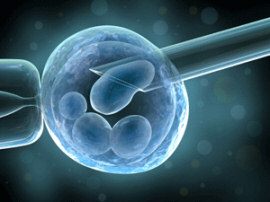The Process of Egg Donation
 Egg donation is when a woman gives certain amount of eggs to other women for
reproduction purposes. Because the eggs are fertilized in laboratories, this
procedure usually involves the process of in vitro fertilization. When eggs are
unfertilized, they are frozen and stored in labs for later use by future
intended parents. Egg donation is when a woman gives certain amount of eggs to other women for
reproduction purposes. Because the eggs are fertilized in laboratories, this
procedure usually involves the process of in vitro fertilization. When eggs are
unfertilized, they are frozen and stored in labs for later use by future
intended parents.
Why Some Women Turn to Egg Donation
Different needs for egg donation may arise for a number of reasons which
includes infertile couples who are willing to undergo the egg donation process.
Couples who do not have the ability to bear children may acquire eggs by getting
egg donation. This may be the case when the female is not capable of having
innate children due to not having eggs, which is the major consideration needed
to generate a sustainable pregnancy. The absence of eggs in a woman may be
caused by ovarian damages due to disease or other related circumstances. On the
other hand, some women are born without ovaries and some may carry a genetic
disorder which makes it impossible for the ovaries to produce eggs.
There are many reasons why a woman decides to participate in egg donation.
Some women donate their eggs for financial reasons but most donors are driven by
altruistic motivations and the satisfaction they get from helping incapable
couples in creating their families. Egg donators remain anonymous to their
recipients and the children who came from the donated eggs. There are women,
however, who become donors to help their friends or family members who are not
capable of conceiving naturally.
Sometimes, advertisements about egg donation provided with fair compensation
are mostly located in campuses and other crowded places. It can be a tempting
proposition, but it is important to think of the long term risks and benefits
that egg donation brings.
Cons of Egg Donation to Recipients
 Egg donation
can not only affect the health of the donor, but the health of the
receiver as well. Medical experts believe that HIV can be transmitted through an
affected egg. However, tests show that transmitting HIV is only possible when
the donor had contact with the virus a few weeks before undergoing the egg
donation cycle. Egg donation
can not only affect the health of the donor, but the health of the
receiver as well. Medical experts believe that HIV can be transmitted through an
affected egg. However, tests show that transmitting HIV is only possible when
the donor had contact with the virus a few weeks before undergoing the egg
donation cycle.
The child having a genetic disorder is also a risk the recipient must face.
Because some egg donation programs have different screening processes, it is the
recipient’s responsibility to communicate with the doctors regarding the mental
health analysis they would execute to be able to prove that the donor’s egg will
be free of genetic disorders.
Cons of Egg Donation to Donors
The donor may suffer from various complications brought by the procedure
which might include bleeding and hyper ovulation, which is caused by hormone
medications they are advised to take during the egg donation cycle. Some other
negative effects include bloating and weight gain. More serious negative effects
are the possibility of having a damaged bowel or bladder. It is very important
to consider how much pain is involved in the process as well as the other long
term negative effects in the health of the donor such as the higher risk of
developing cancer.
How to Become an Egg Donor
To become an egg donor, you must conform to a certain criteria and undergo
psychological, medical and genetic examinations. This program requires that the
donor is at least 21 to 35 years of age. Women who are below 21 are not allowed
to legally agree to contracts. On the other hand, women who are older than 35
may have abnormal eggs, which will raise the possibility of having a child with
birth defects.
Other standards of becoming an egg donor include the following:
-
 Body Mass Index (BMI) must be normal. Body Mass Index (BMI) must be normal.
- Donor must have good family medical records.
- Smoking and substance usage must be absent in the body.
- Must be capable to meet the time requirements for the donation procedure. Egg
donors are expected to organize their schedule to harmonize with the schedules
of the egg donation cycle.
- Donor must agree on not having unprotected sex during the cycle.
- Donors must not use unnecessary medications and does not have any history of
being involved in any treatment for physical abuse.
When these standards are met, selected egg donors will go through medical,
mental and genetic examinations to see what result it may provide right before
they engage to egg donation. After the donor meets all these standards,
information including medical histories, personal interests and photos of
themselves when they were a baby and their recent photo will be provided for the
recipients.
The Egg Donation Cycle
The actual egg donation only takes half an hour to harvest, but preparation
can take a much larger chunk of time to complete. Weeks before the procedure,
the donor must be inoculated with follicle stimulating hormones along with human
chorionic gonadotropin to guarantee that a large amount of eggs will be ready in
time for the procedure. In harvesting the matured eggs, a professional doctor
will make use of suction tubes which will be inserted into the vaginal wall to
remove the excess fluids and target the eggs. The procedure is not painful, but
some doctors may require the egg donor to remain in the hospital for a few days
after it is over. Contractions and some discomfort might be felt for a few days.
Because of the fertility medicine given to the donor to assure multiple egg
maturation, 10% of the egg donors might fall victim to Ovarian Hyper stimulation
Syndrome. This leads a woman to experience fluid retention, abdominal pain, and
short term weight gain. Because of the health risks for donors, they are not
encouraged to repeat the donation process. As compensation, egg donors are paid
$5,000 or higher based on the client and donor’s terms. The eggs which are
harvested from the donor are fertilized in the lab and either implanted into a
mother-to-be or frozen for later use. After a woman gives up an egg donation,
they have no say in what happens to it and they have no obligations to consider.
Medicine & Treatments
Top Lists:
Top 15 Hangover Cures That Actually Work
Top 15 Unusual Ways To Treat Diseases
Informational:
Computerized Physician Order Entry and ePrescribing
Health Data and Importance of Digitization
Nursing Information Systems – Vendor Market Analysis
Telehealth - Healthcare Informatic's Golden Egg
EHR, EMR, PHR – The Digital Future of Health Data
Bloodless Surgery – An Effective Alternative to Blood Transfusion
Medicines That Have Changed the World
The Process of Female Egg Donation
How Chemotherapy Treats Cancer
Thighplasty: Is a Leg Lift Procedure Right for You?
Treating Acne with Laser Therapy: Can it Benefit You?
Using Tanning Beds to Treat Vitamin D Deficiency
Choosing Birth Control
Social History of Patent Medicines
Biology
An Introduction to the Cells of Organisms
Cardiovascular System and Energy Systems |